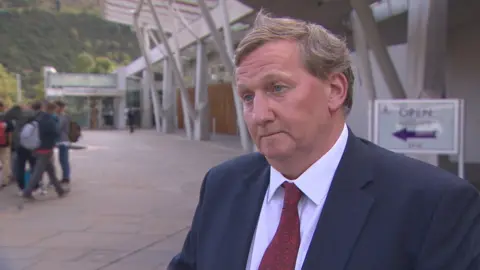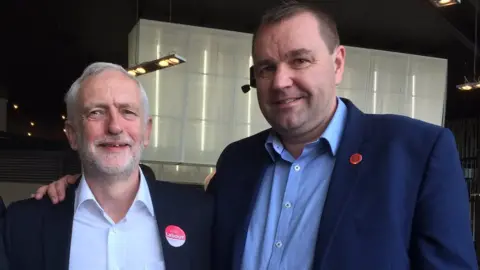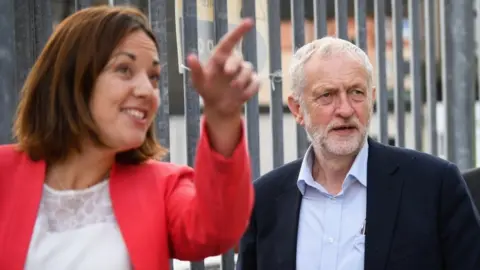Scottish Labour MSPs rule out leadership bids
 BBC
BBCTwo of the early favourites to replace Kezia Dugdale as Scottish Labour leader have ruled themselves out of the race.
Deputy leader Alex Rowley, who is currently acting as interim leader, has said he does not want the job permanently.
Neil Findlay, a close ally of Jeremy Corbyn, has also confirmed he will not be putting his name forward.
And it is understood a third MSP, Monica Lennon, will also not be standing in the leadership contest.
Ms Dugdale stepped down with immediate effect on Tuesday evening, saying she wanted to "hand on the baton" to a new leader with "fresh energy, drive and a new mandate".
Both Mr Findlay and Mr Rowley are supporters of Mr Corbyn, and had been among the early bookmakers' favourites to succeed Ms Dugdale.
She has strongly denied suggestions that she had quit now in order to avoid being pushed out by supporters of Mr Corbyn, many of whom still resent her backing for Owen Smith when he challenged Mr Corbyn for the Labour leadership last year.
Scotland is said to have been the only part of the UK where Mr Smith received more votes than Mr Corbyn in the leadership contest.
But Mr Corbyn's supporters credit him for the party's performance in June's general election - when it won seven seats in Scotland after losing all but one in 2015 - rather than the more centrist Ms Dugdale.
 @NeilFindlay_MSP
@NeilFindlay_MSPMr Findlay, widely seen as Mr Corbyn's closest ally in Scotland, is the convener of the Scottish Campaign for Socialism group. The Labour leader has written the forward for the MSP's forthcoming book, Socialism and Hope.
Mr Findlay stood for the leadership of Scottish Labour after the independence referendum in 2014, but lost out to Jim Murphy despite winning widespread trade union support.
He has since insisted that he would never again seek a leadership role within the party, although there had been speculation he might change his mind once Ms Dugdale stood down.
But in his statement, Mr Findlay confirmed that he would not be putting his name forward, and wished Ms Dugdale and whoever succeeds her "the very best for the future".
He said he instead looked forward to Holyrood returning recess so he could focus on holding the SNP and the Conservatives to account.
Allow X content?
Mr Rowley, a former Fife Council leader who had been Ms Dugdale's deputy, was also touted as a potential leadership candidate. However, he told the BBC that he did not intend to stand.
He said: "Whoever becomes the next leader of the Labour Party in Scotland I believe can seriously contend to be the next first minister of Scotland. I have no desire or ambition to be the next first minister.
"Whoever stands for that position we all will unite behind, because our party is united and we can seriously contend for government in Scotland in four years time.
"Kez has laid the foundations for that, she's built the recovery, that's well under way, so whoever becomes leader needs to be clear that they're going for first minister and we're going to get a Labour government back in Scotland. That has to be our objective."

Analysis by Brian Taylor, BBC Scotland political editor
Do I believe that Ms Dugdale has been ousted in a coup by the left? No, I do not.
Do I believe, nevertheless, that disquiet about her leadership among sections of the left has been an influential factor in her decision? Yes, I do.
To recap a little, Kezia Dugdale was critical of Jeremy Corbyn when he first assumed the UK Labour leadership and when he faced a challenge for that post. As you will all recall, she was scarcely alone in that.
However, she recanted when it appeared that: a) he was going nowhere; b) the party needed to unite; and c) his style and policies appeared to strike something of a chord with the dispossessed.
Intriguingly, the muttering on the left about Ms Dugdale's own stewardship appeared, if anything, to have subsided to some degree. I stress, some.
Someone who is in a position to know is adamant that there was no planned, structured manoeuvring against Ms Dugdale prior to her decision to resign. Most in the party, at least most in senior, elected positions, were rather enjoying the relative peace.
However, that does not mean that she did not face continuing internal criticism.
For example, consider the paper by the Campaign for Socialism which argued that the party's approach in Scotland had been wrong, that it had neglected the Corbynite offer of "for the many, not the few", concentrating instead upon attacking the Nationalists.

 Getty Images
Getty ImagesSeveral supporters of Mr Corbyn within the Scottish party have been privately pushing economy spokesman Richard Leonard as a potential candidate.
Mr Leonard was only elected to Holyrood last year, but has been a strong voice within Scottish Labour for some time and was a key figure in drawing up its industrial strategy for Scotland.
Other potential candidates include former deputy leader Anas Sarwar, as well as the party's business manager at Holyrood, James Kelly, and former interim leader Jackie Baillie, who are all seen as being more centrist than Mr Rowley, Mr Findlay and Mr Leonard.
Ms Dugdale replaced Jim Murphy as Scottish Labour leader in August 2015, after the party lost all but one of its Westminster seats in Scotland to the SNP.
Under her leadership, Labour finished third behind the SNP and Scottish Conservatives in last year's Scottish Parliament election - but went on to win seven seats in the snap general election in June.
Mr Corbyn thanked Ms Dugdale for "the important role she has played in rebuilding the party in Scotland".
"Kezia became Scottish leader at one of the most difficult times in the history of the Scottish Labour Party, and the party's revival is now fully under way, with six new MPs and many more to come," he said.
"I want to thank Kez for her tireless service to our party and movement."
